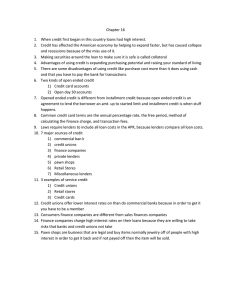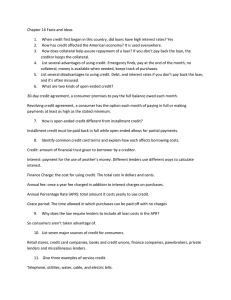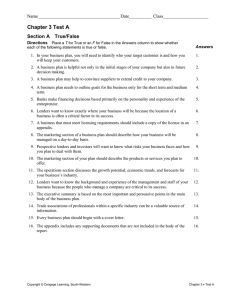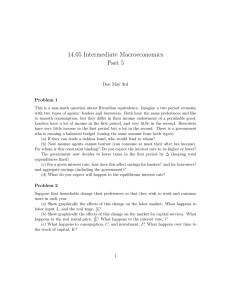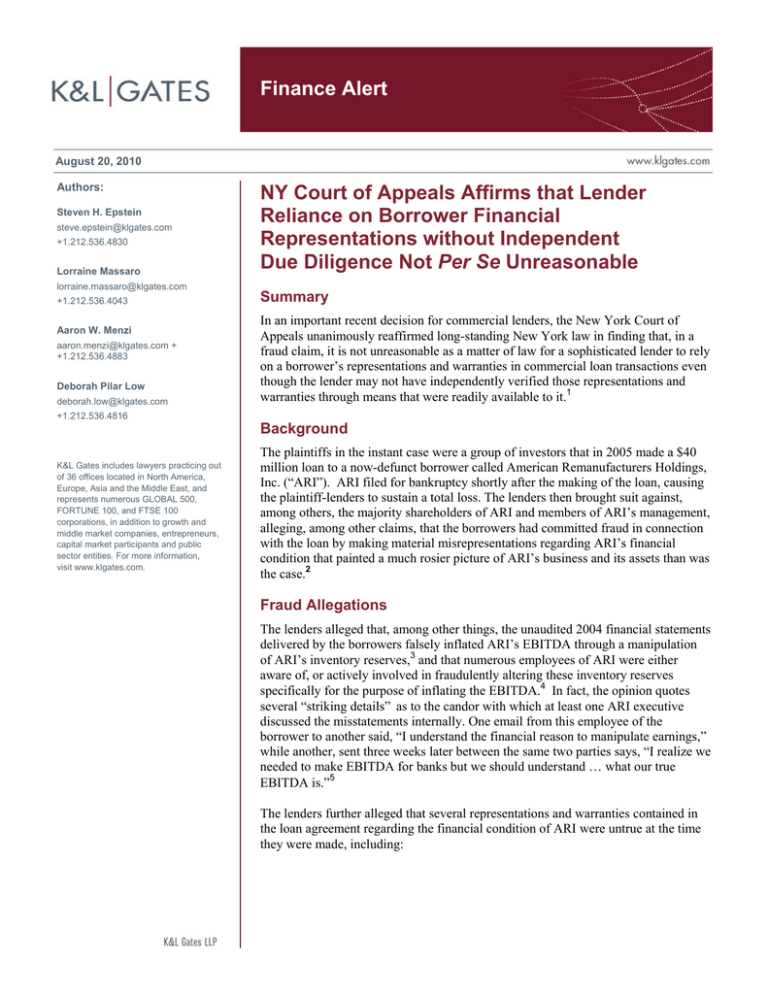
Finance Alert
August 20, 2010
Authors:
Steven H. Epstein
steve.epstein@klgates.com
+1.212.536.4830
Lorraine Massaro
lorraine.massaro@klgates.com
+1.212.536.4043
Aaron W. Menzi
aaron.menzi@klgates.com +
+1.212.536.4883
Deborah Pilar Low
deborah.low@klgates.com
NY Court of Appeals Affirms that Lender
Reliance on Borrower Financial
Representations without Independent
Due Diligence Not Per Se Unreasonable
Summary
In an important recent decision for commercial lenders, the New York Court of
Appeals unanimously reaffirmed long-standing New York law in finding that, in a
fraud claim, it is not unreasonable as a matter of law for a sophisticated lender to rely
on a borrower’s representations and warranties in commercial loan transactions even
though the lender may not have independently verified those representations and
warranties through means that were readily available to it.1
+1.212.536.4816
Background
K&L Gates includes lawyers practicing out
of 36 offices located in North America,
Europe, Asia and the Middle East, and
represents numerous GLOBAL 500,
FORTUNE 100, and FTSE 100
corporations, in addition to growth and
middle market companies, entrepreneurs,
capital market participants and public
sector entities. For more information,
visit www.klgates.com.
The plaintiffs in the instant case were a group of investors that in 2005 made a $40
million loan to a now-defunct borrower called American Remanufacturers Holdings,
Inc. (“ARI”). ARI filed for bankruptcy shortly after the making of the loan, causing
the plaintiff-lenders to sustain a total loss. The lenders then brought suit against,
among others, the majority shareholders of ARI and members of ARI’s management,
alleging, among other claims, that the borrowers had committed fraud in connection
with the loan by making material misrepresentations regarding ARI’s financial
condition that painted a much rosier picture of ARI’s business and its assets than was
the case.2
Fraud Allegations
The lenders alleged that, among other things, the unaudited 2004 financial statements
delivered by the borrowers falsely inflated ARI’s EBITDA through a manipulation
of ARI’s inventory reserves,3 and that numerous employees of ARI were either
aware of, or actively involved in fraudulently altering these inventory reserves
specifically for the purpose of inflating the EBITDA.4 In fact, the opinion quotes
several “striking details” as to the candor with which at least one ARI executive
discussed the misstatements internally. One email from this employee of the
borrower to another said, “I understand the financial reason to manipulate earnings,”
while another, sent three weeks later between the same two parties says, “I realize we
needed to make EBITDA for banks but we should understand … what our true
EBITDA is.”5
The lenders further alleged that several representations and warranties contained in
the loan agreement regarding the financial condition of ARI were untrue at the time
they were made, including:
Finance Alert
(i) that the unaudited 2004 financial statements
presented fairly in all material respects the financial
position of ARI as at December 31, 2004 and the
results of ARI's operations and cash flows for the
period then ended and were prepared in accordance
with GAAP;
(ii) that between December 31, 2003 and March 22,
2005 [the closing date for the loan], no event
occurred, which alone or together with other events,
could reasonably be expected to have a Material
Adverse Effect on ARI's business, assets, operations
or prospects, or its ability to repay the loan; and
(iii) that no information contained in the loan
agreement, the other loan documents or the financial
statements furnished to the lenders contained any
untrue statement of a material fact or omitted to state
a material fact necessary to make the statements
contained therein not misleading in light of the
circumstances under which they were made.6
The “You Should Have Known I Was
Lying Defense”
In response to the lenders’ claims, the borrowers
argued that several significant inconsistencies in the
unaudited 2004 financial statements should have led
lenders to question the truthfulness of the
information provided, but since lenders failed to dig
deeper into the reality behind the financial
statements (i.e., make a reasonable inquiry into the
truth of the statements) and the representations made
by the borrowers in the loan agreement, lenders were
not justified in relying on the accuracy of the
representations.7
Appellate Division Misconstrued
Precedent Applicable to Sophisticated
Lenders
The lower court had allowed the fraud claims
against certain of the plaintiffs to stand against a
motion to dismiss, but on appeal by the borrowers,
the Appellate Division reversed, claiming that
certain New York decisions it viewed as precedent
held that “[a]s a matter of law [emphasis added], a
sophisticated plaintiff cannot establish that it entered
into an arm’s length transaction in justifiable
reliance on alleged misrepresentations if that
plaintiff failed to make use of the means of
verification that were available to it” and “[t]o
sustain a claim for fraud, sophisticated investors, as
here, must have discharged their own affirmative
duty [emphasis added] to exercise ordinary
intelligence and conduct an independent appraisal of
the risks they are assuming.”8 The Appellate
Division emphasized that the lenders never
conducted any due diligence into ARI’s book and
records underlying the 2004 financial statements on
which lenders primarily relied in making the loan to
ARI and having failed to do so, they could not
properly allege reasonable reliance on the purported
misrepresentations.9
Reasonability of Reliance is a
Question for the Trier of Fact, Not a
Per Se Determination as a Matter of
Law
In reversing the decision of the Appellate Division,
the New York Court of Appeals (the state’s highest
court) denied the imposition of such a due diligence
burden on lenders as a matter of law by holding
that, where a plaintiff has taken “reasonable steps
[emphasis added] to protect itself against deception,
it should not be denied recovery merely because
hindsight suggests that it might have been possible
to detect the fraud when it occurred”10, instead
noting that no duty to make an independent
investigation arose as soon as “hints of any
possibility of falsehood” came to light, but rather
that it was a question for a trier of fact as to whether
a plaintiff was reasonable in relying on the
information received.11
In addition, the Court of Appeals made note of the
fact that that the precedents relied on by the
Appellate Division were derived from a series of
cases intending to deny lenders relief from fraud
claims where (i) the lenders neglected to take
reasonable and available measures to protect
themselves, (ii) sophisticated business entities made
so-called hypocritical reliance claims where it was
truly apparent that they knew that the
representations and information provided to them
were false but nonetheless claimed to have been
“taken in” and (iii) the lenders were so lax in
protecting themselves that they were not deserving
of the law’s protection.12 Perhaps even more
significant was the argument of the Loan
Syndications and Trading Association, the Clearing
House Association and the Commercial Finance
August 20, 2010
2
Finance Alert
Association in an amicus brief filed on behalf of the
lenders, that in the decisions cited by the Appellate
Division the lenders did not use representations and
warranties obtained from the borrowers to justify
reliance on unaudited financial statements.13
Importantly, the Court of Appeals acknowledged
that the lenders in Rhone could have followed up on
the hints of fraudulent conduct, but emphasized that
specifically bargaining for representations and
warranties regarding the reliability of financial
information being provided, as the plaintiffs in
Rhone did, could support a jury finding that the
plaintiffs had ample justification for accepting such
statements as being true. “Indeed, there are many
cases in which the plaintiff’s failure to obtain a
specific, written representation is given as a reason
for finding reliance to be unjustified.”14
The Impact of Rhone on the
Commercial Lending Market
Had the Court of Appeals upheld the decision of the
Appellate Court, it would have had significant
ramifications on the commercial lending market. As
argued in the amicus brief, imposing an affirmative
duty of investigation on lenders would dramatically
change the lending market by forcing lenders to
undertake time-consuming and costly measures to
independently verify financial information provided
by a borrower. Additionally, the amicus brief noted
that such a change in commercial finance law would
create a staggering burden on the credit industry and
would “upset lenders’ settled expectations in
countless existing loan obligations...at a time when
commercial lending is already painfully
restricted.”15
The amicus brief also made the argument that the
lenders in Rhone had followed generally accepted
commercial practices in making the loan in March
2005 (whether these practices continue to be
generally accepted today with the hindsight of the
financial crisis is unclear). An important point made
by the amicus brief nevertheless is that the rule
announced by the Appellate Division did not take
into account the realities of commercial lending,
arguing that commercial lenders are not auditors of
their prospective borrowers or purchasers of the
borrower’s businesses and in general are not
equipped to undertake such costly and timeconsuming examinations before making loans. The
brief further stated that the law of New York
regarding the purpose and function of warranties
would be rendered pointless by the Appellate
Division’s rule.16
Would a Lender’s Failure to Obtain
Representations and Warranties
Justify a Finding of Unreasonable
Reliance?
The Court of Appeals ruling in Rhone is also
significant in its emphasis on the importance of
including specific and comprehensive
representations and warranties in agreements,
particularly representations and warranties relating
to the truthfulness of the facts specified therein. In
deciding that lenders in the Rhone case could have
been justified in relying on the truthfulness of the
financial statements provided by borrowers, the
Court of Appeals focused on the fact that the
lenders had specifically negotiated for the
borrowers’ representation that certain facts were
true, and noted that this step could justify reliance
without requiring further inquiry. In contrast, as
noted above, the court noted several cases where a
plaintiff’s failure to obtain such a specific written
representation was grounds for finding that the
plaintiff was not justified in relying on information
provided by the defendant.
Effect of Ruling
The ruling in Rhone clearly validates and
underscores the value of a commercial lender
obtaining representations and warranties as to the
adequacy and truthfulness of financial and other
relevant disclosure by borrowers. Under certain
factual circumstances, lenders will be able to rely on
these representations in bringing successful fraud
actions against borrowers. Nonetheless, lenders
should not assume that obtaining such
representations and warranties is a substitute for
customary due diligence in all circumstances or a
substitute for proper inquiry in situations where the
lenders may have some indication that information
provided by borrowers may be inaccurate or
incomplete.
August 20, 2010
3
Finance Alert
1 DDJ Management, LLC v. Rhone Group L.L.C., 2010
Westlaw 2516811 (N.Y.), 2010 N.Y. Slip Op. 05603.
2 Id.
3 Id. The accounting change that resulted in the vastly
improved 2004 EBITDA number was solely due to the fact
that 2003 reserves were taken for items remaining unsold
for at least one year and 2004 reserves were taken only for
items unsold for over two years and plaintiffs were never
informed of this change as between the two periods.
4 Id.
5 Id.
6 Id .
7 Id.
8 DDJ Management, LLC v. Rhone Group L.L.C., 60
A.D.3d 421, 875 N.Y.S.2d 17 (N.Y. App. Div. 1st Dep’t
2009), N.Y. Slip Op. 01575 citing UST Private Equity Invs.
Fund v. Salomon Smith Barney, 288 A.D.2d 87, 88, 733
N.Y.S.2d 385 (N.Y. App. Div. 1st Dep’t 2001).
9 Id.
10 DDJ Management, LLC v. Rhone Group L.L.C., 2010
Westlaw 2516811 (N.Y.), 2010 N.Y. Slip Op. 05603.
11 Id. While the court noted that as a matter of law, the
plaintiffs could have been justified in relying on the
representations and warranties of the defendants, the case
was remanded to determine whether the facts of this case
supported that reliance.
12 Id., citing Global Mins. & Metals Corp. v. Holme, 35
A.D.2d 93, 100, 824 N.Y.S.2d 210 (N.Y. App. Div. 1st Dep’t
2006) and Lampert v. Mahoney, Cohen & Co., 218 A.D.2d
580, 582 (N.Y. App. Div. 1st Dep’t 1995).
13 Brief of Loan Syndications and Trading Association et
al. as Amici Curiae Supporting Plaintiffs-Appellants, DDJ
Management, LLC v. Rhone Group L.L.C., 2010 Westlaw
2516811 (N.Y.), 2010 N.Y. Slip Op. 05603.
14 DDJ Management, LLC v. Rhone Group L.L.C., 2010
Westlaw 2516811 (N.Y.), 2010 N.Y. Slip Op. 05603 citing
Curran, Cooney, Penney v. Young & Koomans, 183 A.D.2d
742, 743-744 (N.Y. App. Div. 2d Dep’t 1992); Rodas v.
Manitaras, 159 A.D.2d 341, 343 (N.Y. App. Div. 1st Dep’t
1990); Emergent Capital Investment Management, LLC v.
Stonepath Group, Inc., 343 F.3d 189, 196 (2d Cir. 2003).
See also Merrill Lynch & Co. v. Allegheny Energy, Inc., 500
F.3d 171, 181-182 (2d Cir. 2007); Barron Partners, LP v.
Lab 123, Inc.; 2008 WL 2902187, 2008 U.S. Dist. LEXIS
56899 (S.D.N.Y. 2008); JPMorgan Chase Bank v. Winnick,
350 F. Supp. 2d 393 (S.D.N.Y. 2004); Faller Group, Inc. v.
Jaffe, 564 F. Supp. 1177 (S.D.N.Y. 1983). The Court of
Appeals then noted that it is harder to find cases holding
that a plaintiff who did obtain representations could not
justifiably rely on them, noting one where the plaintiff’s
attorney actually knew that the representation in question
was false. Ponzini v. Gatz, 155 A.D.2d 590 (N.Y. App. Div.
2d Dep’t 1989).
15 Brief of Loan Syndications and Trading Association et
al. as Amici Curiae Supporting Plaintiffs-Appellants, DDJ
Management, LLC v. Rhone Group L.L.C., 2010 Westlaw
2516811 (N.Y.), 2010 N.Y. Slip Op. 05603.
16 Id.
Anchorage Austin Beijing Berlin Boston Charlotte Chicago
Dallas Dubai Fort Worth Frankfurt Harrisburg Hong Kong London
Los Angeles Miami Moscow Newark New York Orange County
Palo Alto Paris Pittsburgh Portland Raleigh Research Triangle
Park
San Diego San Francisco Seattle Shanghai Singapore
Spokane/Coeur d’Alene Taipei Tokyo Warsaw
Washington, D.C.
K&L Gates includes lawyers practicing out of 36 offices located in North
America, Europe, Asia and the Middle East, and represents numerous
GLOBAL 500, FORTUNE 100, and FTSE 100 corporations, in addition
to growth and middle market companies, entrepreneurs, capital market
participants and public sector entities. For more information, visit
www.klgates.com.
K&L Gates comprises multiple affiliated entities: a limited liability
partnership with the full name K&L Gates LLP qualified in Delaware and
maintaining offices throughout the United States, in Berlin and Frankfurt,
Germany, in Beijing (K&L Gates LLP Beijing Representative Office), in
Dubai, U.A.E., in Shanghai (K&L Gates LLP Shanghai Representative
Office), in Tokyo, and in Singapore; a limited liability partnership (also
named K&L Gates LLP) incorporated in England and maintaining offices
in London and Paris; a Taiwan general partnership (K&L Gates)
maintaining an office in Taipei; a Hong Kong general partnership (K&L
Gates, Solicitors) maintaining an office in Hong Kong; a Polish limited
partnership (K&L Gates Jamka sp.k.) maintaining an office in Warsaw;
and a Delaware limited liability company (K&L Gates Holdings, LLC)
maintaining an office in Moscow. K&L Gates maintains appropriate
registrations in the jurisdictions in which its offices are located. A list of
the partners or members in each entity is available for inspection at any
K&L Gates office.
This publication is for informational purposes and does not contain or
convey legal advice. The information herein should not be used or relied
upon in regard to any particular facts or circumstances without first
consulting a lawyer.
©2010 K&L Gates LLP. All Rights Reserved.
August 20, 2010
4

